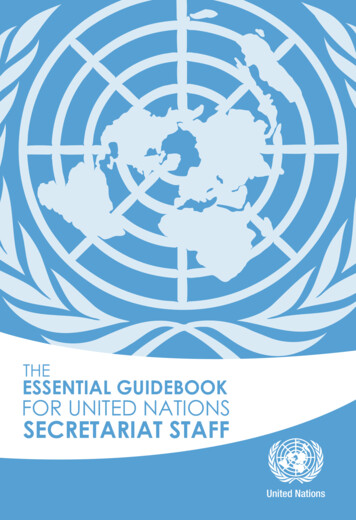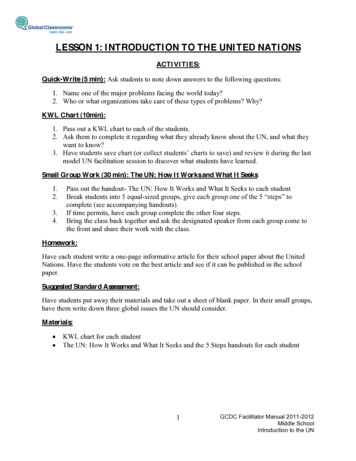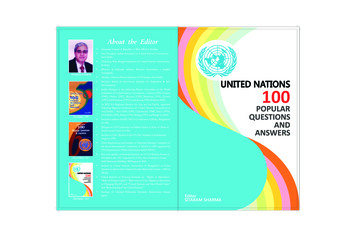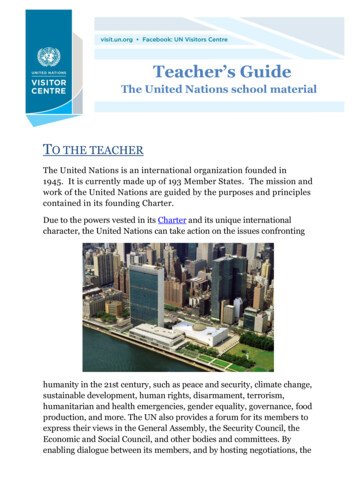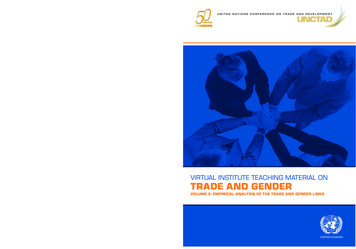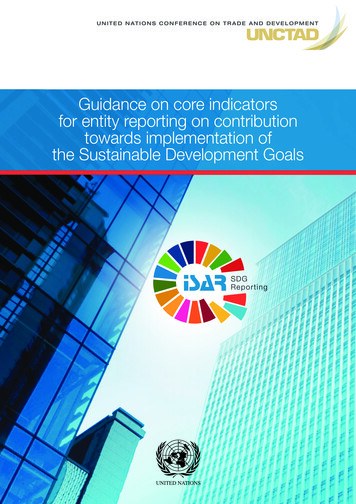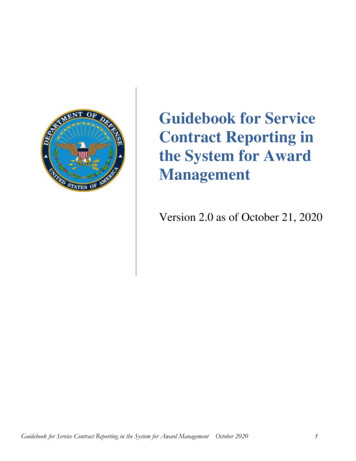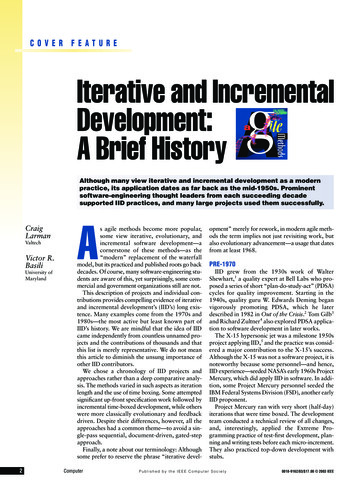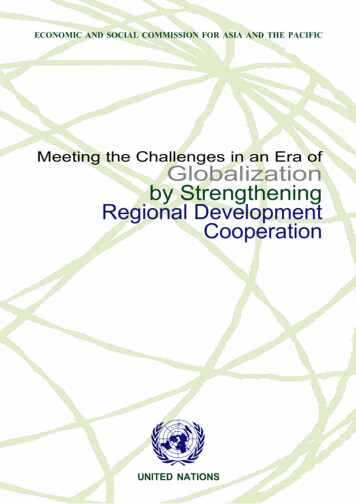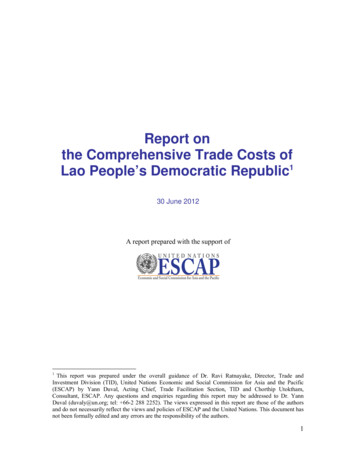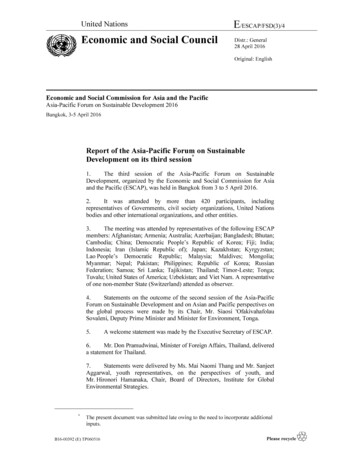
Transcription
United NationsE/ESCAP/FSD(3)/4Economic and Social CouncilDistr.: General28 April 2016Original: EnglishEconomic and Social Commission for Asia and the PacificAsia-Pacific Forum on Sustainable Development 2016Bangkok, 3-5 April 2016Report of the Asia-Pacific Forum on SustainableDevelopment on its third session*1.The third session of the Asia-Pacific Forum on SustainableDevelopment, organized by the Economic and Social Commission for Asiaand the Pacific (ESCAP), was held in Bangkok from 3 to 5 April 2016.2.It was attended by more than 420 participants, includingrepresentatives of Governments, civil society organizations, United Nationsbodies and other international organizations, and other entities.3.The meeting was attended by representatives of the following ESCAPmembers: Afghanistan; Armenia; Australia; Azerbaijan; Bangladesh; Bhutan;Cambodia; China; Democratic People’s Republic of Korea; Fiji; India;Indonesia; Iran (Islamic Republic of); Japan; Kazakhstan; Kyrgyzstan;Lao People’s Democratic Republic; Malaysia; Maldives; Mongolia;Myanmar; Nepal; Pakistan; Philippines; Republic of Korea; RussianFederation; Samoa; Sri Lanka; Tajikistan; Thailand; Timor-Leste; Tonga;Tuvalu; United States of America; Uzbekistan; and Viet Nam. A representativeof one non-member State (Switzerland) attended as observer.4.Statements on the outcome of the second session of the Asia-PacificForum on Sustainable Development and on Asian and Pacific perspectives onthe global process were made by its Chair, Mr. Siaosi 'OfakivahafolauSovaleni, Deputy Prime Minister and Minister for Environment, Tonga.5.A welcome statement was made by the Executive Secretary of ESCAP.6.Mr. Don Pramudwinai, Minister of Foreign Affairs, Thailand, delivereda statement for Thailand.7.Statements were delivered by Ms. Mai Naomi Thang and Mr. SanjeetAggarwal, youth representatives, on the perspectives of youth, andMr. Hironori Hamanaka, Chair, Board of Directors, Institute for GlobalEnvironmental Strategies.*The present document was submitted late owing to the need to incorporate additionalinputs.B16-00392 (E) TP060516
E/ESCAP/FSD(3)/48.The Forum elected the following Bureau members:(a)Chair:Mr. Gamini Jayawickrama Perera (Sri Lanka)(b)Vice-Chairs:Mr. Yuba Raj Khatiwada (Nepal)Mr. Ahsan Iqbal (Pakistan)Mr. Battsereg Namdag (Mongolia)Mr. Emmanuel F. Esguerra (Philippines)Mr. Pichet Durongkaveroj (Thailand)Mr. Constâncio da Conceição Pinto (Timor-Leste)Mr. S.B. Dissanayake (Sri Lanka)(c)Rapporteur:Mr. Tuon Thavrak (Cambodia)9.The meeting adopted the following agenda:1.Opening of the session.2.Election of officers.3.Adoption of the agenda.4.Regional priorities for the implementation of the 2030 Agendafor Sustainable Development in Asia and the Pacific.5.Regional road map for implementing the 2030 Agenda forSustainable Development and the form and function of theAsia-Pacific Forum on Sustainable Development and its followup and review process.6.Science, technologydevelopment.7.Making cities inclusive, safe, resilient and sustainable: regionalpriorities and opportunities.8.Other matters.9.Review and adoption of the draft report of the Forum.10.Closing of the session.andinnovationforsustainable10.The present report was adopted on 5 April 2016 by the Forum. TheChair’s summary on regional priorities for the implementation of the2030 Agenda for Sustainable Development in Asia and the Pacific iscontained in the annex.11.The Forum was informed of the discussions of the preparatorymeeting of senior officials on the regional road map for implementing the2030 Agenda for Sustainable Development in Asia and the Pacific and theform and function of the Asia-Pacific Forum on Sustainable Development,which was held on 2 April 2016.2B16-00392
E/ESCAP/FSD(3)/412.The Forum was further informed of the outcomes of the Asia-PacificCivil Society Forum on Sustainable Development, which was organized byESCAP, in collaboration with the Asia Pacific Forum on Women, Law andDevelopment and other civil society organizations on behalf of the AsiaPacific Regional CSO Engagement Mechanism as well as the United NationsEnvironment Programme and the United Nations Department of Economicand Social Affairs, and held in Bangkok from 31 March to 2 April 2016.13.Associated events were held on voluntary national reviews as well ason Sustainable Development Goals 6 and 10.14.A special event entitled “Global Partnership on SustainableDevelopment Data” was held. Side events entitled “Building KnowledgePartnerships: Academia and UN System Knowledge Platforms for Advancingthe SDGs”; “Achieving Gender Equality and Women’s Empowerment:Transforming Economies, Realizing the 2030 Agenda”; and “Are we ready tobuild inclusive and engaging societies?” were held. The joint report ofESCAP, the United Nations Environment Programme, the United NationsUniversity and the Institute for Global Environmental Strategies entitledTransformations for Sustainable Development: Promoting EnvironmentalSustainability in Asia and the Pacific was launched.15.In accordance with the agreement reached at the second session of theForum in 2015 that the form, function and modalities of the Forum should bedecided at its third session through an intergovernmental consultativeprocess, member States recommended the following:(a) Bearing in mind that the form, functions and modalities of theForum should be guided by decisions taken at the high-level political forumon sustainable development and should not prejudge those decisions, and,taking into account budgetary implications yet to be decided by member States,must not increase the reporting burdens of the member States nor the budgetand operating costs of ESCAP, the Forum may serve as a regional platform for:(i)Supporting countries, in particular countries with special needs,including through enhancing their capacity for implementation of the2030 Agenda for Sustainable Development;(ii) Providing a regional perspective on the implementation of thesustainable development agenda by identifying regional trends, andconsolidating and sharing best practices and lessons learned, takinginto account the contributions of other United Nations system bodiesat the regional level, other regional and subregional organizations andrelevant stakeholders;(iii) Supporting follow-up and review of progress on the2030 Agenda and the Sustainable Development Goals at the regionallevel. Detailed implementation arrangements will be decided afteragreement in the General Assembly and will be further discussed;(b) The Forum may be convened annually as an inclusiveintergovernmental forum preparatory to the high-level political forum and thetheme of the Forum should be consistent with that of the high-level political forum;(c) The current format, including the election of the bureau and cochairs for the session could be maintained, including providing a space formulti-stakeholder engagement for implementation of the 2030 Agenda forSustainable Development in consultation as appropriate with member States;(d) The outcome of the Forum will be in the form of a report withan annexed chair’s summary;B16-003923
E/ESCAP/FSD(3)/4(e) As an inclusive intergovernmental platform that is part of theconference structure of ESCAP, the Forum:(i)Could have its formal report presented by the chair or rapporteurof the Forum to the Commission, with an annexed chair’s summary;(ii) Could receive inputs from ESCAP committees and otherrelevant stakeholders;(iii) Shall benefit from the Advisory Committee of PermanentRepresentatives of ESCAP as a modality for consulting Governmentsbetween sessions;(f) Preparatory meetings of stakeholders may be convened, withinexisting resources;(g) The procedural aspects of the Forum could be generally guidedby the following:(i) The Forum, including stakeholder engagement, will follow therules of procedure of the Commission as well as the modalities of thehigh-level political forum under the auspices of the Economic andSocial Council as long as there is no conflict between them;(ii) During each session, a member of the bureau of the previous sessioncould report on the discussions at the intervening high-level politicalforum and on the conclusions of the previous session of the Forum;(h) The conduct of the Forum must avoid duplication with otherregional forums and platforms. In the interest of efficiency, whereappropriate, it is proposed that the Forum be convened in coordination orcollaboration with other forums and platforms;(i)The form, function and modalities of the Forum will bemodified/decided upon in 2016 and 2017 taking into account the inputs fromthe high-level political forum on sustainable development regarding the2030 Agenda for Sustainable Development and then periodically by memberStates, and adjusted as appropriate.16.In accordance with the agreement reached at the second session of theForum in 2015 that the third session should initiate the process to develop aregional road map for implementation of the 2030 Agenda, member Statessuggested developing a regional road map for implementing the 2030 Agendafor Sustainable Development in Asia and the Pacific and identified thefollowing points as the foundation for the development and implementationof the road map.A.Objectives and scope of the road map(a) This road map is for members and associate members ofESCAP to cooperate at the regional level, guided by all the principlesreaffirmed and agreed to in the 2030 Agenda for Sustainable Development, inthe implementation of the 2030 Agenda in Asia and the Pacific, as providedfor by the General Assembly in its resolution 70/1 and the Addis AbabaAction Agenda of the Third International Conference on Financing forDevelopment;(b) The road map will give particular emphasis on supporting theimplementation of the 2030 Agenda for Sustainable Development by thedeveloping countries, in particular, least developed countries, landlockeddeveloping countries, small island developing States and other countries withspecial needs, while maintaining the universality of the 2030 Agenda andtaking into account different national realities, capacities and levels of development4B16-00392
E/ESCAP/FSD(3)/4and respect for policy space and priorities while remaining consistent withrelevant international rules and commitments, and creating no additionalreporting requirements for Governments;(c) Member States are expected to identify priority areas ofcooperation and implementation of the 2030 Agenda for SustainableDevelopment in Asia and the Pacific, with particular emphasis on the practicalmeans of implementation to achieve the Sustainable Development Goals;(d) Member States noted the support by the secretariat, within itsexisting resources and mandates, to:(i) Facilitate discussions among member States in the lead-up to itssession in 2017, by leveraging the conference structure of ESCAP andmaking full use of planned meetings for 2016 and 2017, including theseventh Ministerial Conference on Environment and Development inAsia and the Pacific, as well as expert group meetings and otherexisting meetings and activities planned under the Commission’sprogramme of work for 2016-2017;(ii) Promote multi-stakeholder engagement by facilitating inputsand views from various stakeholders as appropriate;(iii) Mobilize support from, among other sources, the agencies,funds and programmes of the United Nations by leveraging the AsiaPacific Regional Coordination Mechanism;(iv) Undertake a needs assessment and gap analysis.B.Timeline and milestones(a) Member States intend to continue consultations to definepriority areas, based on the following tentative timeline, which should beconsistent and synergetic with the global debate on implementation of the2030 Agenda for Sustainable Development:2016-2017: stocktaking A needs assessment and gap analysis will be conducted by thesecretariat in consultation with member States where necessary.2018-2030: implementation The areas of cooperation that have been identified will beimplemented;(b) Member States may continue consultations and discussionsregarding any possible specific areas for cooperation for implementation ofthe road map, as appropriate;(c) Member States may revise the above timeline and set of milestonesas appropriate at any given time as part of the process of assessment andupdate of the road map.17.The Forum concluded that the present report, including its annex,should be brought to the attention of the Commission at its seventy-secondsession, to be held from 15 to 19 May 2016, and to the global dialogues onsustainable development, including in particular, the fourth session of thehigh-level political forum convening under the auspices of the Economic andSocial Council from 11 to 15 July 2016 at United Nations Headquarters withthe theme “Ensuring that no one is left behind”.B16-003925
E/ESCAP/FSD(3)/4AnnexChair’s summary of discussions at the Asia-Pacific Forum onSustainable Development 20161.The third session of the Asia-Pacific Forum on SustainableDevelopment was the first regional meeting held after the adoption of the2030 Agenda for Sustainable Development in September 2015, both in theAsia-Pacific region and the other regions, and has contributed to shaping theregional response to the 2030 Agenda. During the three-day meeting,participants discussed priorities for implementing the 2030 Agenda in Asiaand the Pacific. The Forum addressed the topic of social vulnerabilities andhighlighted the importance of data and the need for systematic analysis of theSustainable Development Goals. It addressed how science, technology andinnovation can be used to integrate the three dimensions of sustainabledevelopment, as well as the significance of building inclusive, safe, resilientand sustainable cities in the region. As mandated by the second session of theForum, proposals regarding the form, function and modalities of the Forumwere presented; member States made recommendations in that regard. Theprocess to develop a regional road map was initiated and the foundations of aroad map have been identified.I.Session 1. Regional priorities for implementation: overview2.In session 1, participants initiated a regional dialogue on priorities forimplementing the 2030 Agenda in Asia and the Pacific and presented apreliminary assessment of the status of implementation of the SustainableDevelopment Goals. Participants explored regional megatrends impacting theneeds and abilities of individual countries, as well as their developmentoutcomes, and highlighted priorities for regional action to support nationalGovernments.3.The session was chaired by Mr. Yuba Raj Khatiwada, Vice-Chair,National Planning Commission, Nepal, and moderated by Mr. Jonas Leones,Undersecretary for Environment and International Environmental Affairs,Department of Environment and Natural Resources, Philippines. Panellists inthe session included Mr. Battsereg Namdag, Minister of Environment, GreenDevelopment and Tourism, Mongolia; Mr. Gamini Jayawickrama Perera,Minister of Sustainable Development and Wildlife, Sri Lanka;Mr. Constâncio da Conceição Pinto, Minister of Commerce, Industry andEnvironment, Timor-Leste; Mr. Ilyosiddin Kamolitdinov, Deputy Minister ofEconomy, Tajikistan; and Mr. Saber Hossain Chowdhury, Member ofParliament and President of the Inter-Parliamentary Union.4.Following the introduction to the session by the Chair, the ExecutiveSecretary opened the session by reflecting on megatrends affecting the regionand outlining priority areas for the secretariat’s support to member States toensure that the region shifted to the implementation of the SustainableDevelopment Goals in the shortest possible time frame.5.The moderator further highlighted economic, social andenvironmental megatrends in the Philippines. While challenging, he notedthat such trends also provided opportunities, including through thereformulation of policies and the forging of new partnerships. Panellistsreflected on regional megatrends and also identified national- andsubnational-specific trends, including vulnerability to natural disasters,isolation from markets, clean energy, food security and youthful populations.Speakers highlighted the need for immediate national responses based on6B16-00392
E/ESCAP/FSD(3)/4national ownership and policy coherence with the 2030 Agenda, whileunderlining that the tasks ahead in implementing the SustainableDevelopment Goals would need strengthened regional cooperation andgreater capacity development, technical assistance and financial support.6.Member States highlighted current challenges to the realization ofsustainable development as well as the need to move away from theinefficient use of natural resources and address environmental degradation; toeffectively harness economic growth to eradicate poverty; to invest in socialpolicy, especially through comprehensive social protection policies, with afocus on youth; to address gaps in finance and capacity; to ensure access towater, food, education and energy for all; and to address the threats posed byclimate change and natural disasters. It was recognized that a regional,concerted and effective response should be made to ensure that no one wasleft behind in the implementation of the sustainable development agenda.While the 2030 Agenda was noted as ambitious, delegations highlighted thatit also provided an opportunity to shift away from “business as usual” and tomore effectively address the complex and multisectoral challenges. Moreholistic approaches that integrated the social, economic and environmentaldimensions of sustainable development were seen as indispensable to theachievement of the 2030 Agenda.7.Member States noted that the 2030 Agenda was complementary tonational priorities and visions, though its scope meant that some countrieswould need to prioritize in certain areas. Member States further sharedinitiatives already in place or being developed to support implementation ofthe 2030 Agenda. Some member States had adopted the SustainableDevelopment Goals as part of national development plans and incorporated theminto national legislation. National institutional set-ups were being established,including those led by Heads of State, as well as by national secretariats, whileengaging subnational governments and civil society. The 2030 Agenda was seenas highly compatible with national development philosophies and goals, butparticipants noted that more needed to be done to link the SustainableDevelopment Goals with specific programmes and strategies.8.Member States emphasized that regional processes should be alignedwith national and global priorities and commitments defined at the high-levelpolitical forum on sustainable development, should be voluntary and locallydefined, and should be clearly focused on socioeconomic issues as well asimplementation. While there were specific national priorities and reviewmodalities to be respected, regional cooperation was considered as essentialfor addressing national country priorities. Regional mechanisms couldsupport implementation through capacity development, financing,strengthening capacity in statistics and data through advisory services,training and technical assistance, South-South exchange and strengtheningeconomic cooperation.9.Civil society organizations called for regional action to ensure thatmember States’ commitments to the implementation of the 2030 Agenda andthe Sustainable Development Goals would be realized, including adherenceto human rights, ensuring social protection, providing universal access tohealth and education, shifting to sustainable agriculture to end hunger, endingall forms of marginalization and discrimination, and institutionalizedparticipation based on the principles set at the high-level political forum onsustainable development.B16-003927
E/ESCAP/FSD(3)/4II.Session 2. Regional priorities for implementation: statistics andmainstreaming of the Sustainable Development Goals to address vulnerability10.This session focused on social vulnerabilities faced by the region andthe role of integrated analysis to identify priorities in implementing theSustainable Development Goals in national contexts, as well as theimportance of high-quality disaggregated data and statistics to supportrigorous and evidence-based follow-up and review.11.The session was chaired by Mr. Ahsan Iqbal, Minister of Planning,Development and Reform, Pakistan, who also moderated a panel discussionconsisting of Mr. Yuba Raj Khatiwada, Vice-Chair, National PlanningCommission, Nepal; Mr. Emmanuel F. Esguerra, Secretary, SocioeconomicPlanning, Philippines; Mr. Sonam Wangchuk, Secretary, Gross NationalHappiness Commission, Bhutan; Mr. Sefuiva Reupena Muagututia,Government Statistician, Samoa Bureau of Statistics, Samoa; Mr. PanmaoZhai, Intergovernmental Panel on Climate Change, working group 1Co-Chair; Mr. Santosh Mehrotra, Professor of Economics, Centre forInformal Sector and Labour Studies, School of Social Sciences, JawaharlalNehru University, India.12.The Forum emphasized that the successful implementation of theSustainable Development Goals should not result in islands of prosperity andislands of poverty, but should rather bridge various communities byaddressing vulnerabilities. Vulnerable groups included women, indigenouspeoples, older persons, persons with disabilities, migrants, agriculturalworkers, youth and informal sector workers, as they are without socialprotection. It was noted that developing countries in Asia and the Pacific, inparticular least developed countries and small island developing States, werealso vulnerable to the impact of climate change and natural disasters, such assea level rise, cyclones, landslides, flooding and drought. In this regard, thepanel called for a holistic approach to sustainable development that addressedthe Sendai Framework for Disaster Risk Reduction 2015-2030 and the ParisAgreement. In this connection, the Forum recommended that a regional roadmap for implementing the 2030 Agenda must address these vulnerabilities.13.The Forum highlighted the need to adapt the global SustainableDevelopment Goal indicators to the specific conditions of each country andthat national and regional review processes could help to focus policies toallocate resources and identify areas where assistance was needed. TheForum noted that review processes should complement existing processesand that outcomes of regional and national reviews could provide feedbackand support advocacy for the political commitment to achieve the Goals, aswell as provide an opportunity for learning and sharing of best practices.14.The Forum noted the importance of high-quality, timely, accessible,reliable, relevant data and statistics disaggregated by income, sex, age, race,ethnicity, migration status, disability and geographical location and othercharacteristics relevant to national context. The Forum highlighted that datawas needed for evidence-based interventions. In particular, a statisticalframework that captured vulnerabilities was needed to direct resourcestowards addressing inequalities.15.Recognizing the gaps in data availability, the quality required for theimplementation of the Sustainable Development Goals and the constraints innational statistical capacity, the Forum highlighted that a data revolution andtransformative action, as well as a revision of data ecosystems and strongpartnerships with development partners, were needed to respond to the need8B16-00392
E/ESCAP/FSD(3)/4for data. In this connection, the Forum commended the leadership of theCommittee on Statistics in enhancing capacity-building support to increasethe availability of high-quality, timely, reliable data.16.The Forum expressed support for developing multi-stakeholderplatforms to enhance participation and accountability in the monitoring andreview of progress. It further highlighted the need for supporting regionalknowledge exchange for follow-up and review.17.Civil society highlighted the need for the regional road map toincorporate indicators and disaggregation of the data most relevant to theregion and emphasized the need for targeted and sustained action plans withallocated budgets, including data collection, analysis and reporting, to ensurethe effective participation of marginalized groups in the implementation ofthe Sustainable Development Goals.III. Session 3. Regional road map for implementing the 2030 Agendafor Sustainable Development and the form and function of the AsiaPacific Forum on Sustainable Development18.The second session of the Forum requested that the third session ofthe Forum, in 2016, initiate and define a regional roadmap and decide on theform, function and modalities of the Forum by means of an intergovernmentalconsultative process. Session 3 of the Forum discussed proposals in this regard.19.The session was chaired by Mr. Constâncio da Conceição Pinto,Minister of Commerce, Industry and Environment, Timor-Leste. Mr. JonasLeones, Undersecretary for Environment and International EnvironmentalAffairs, Department of Environment and Natural Resources, Philippines,reported as Chair of the preparatory meeting of senior officials on theregional road map for implementing the 2030 Agenda in Asia and the Pacificand the form and function of the Asia-Pacific Forum for SustainableDevelopment, which was held on 2 April 2016. The preparatory meeting wasattended by representatives of 28 ESCAP member States, one non-memberState and representatives of civil society. The Chair reflected on the supportfor the Forum expressed at the preparatory meeting and shared an overviewof the areas in which there had been a convergence of views with respect tothe form and function of the Forum and the regional road map.20.Statements by Governments acknowledged that while many decisionshad yet to be taken at the global level, there was strong support for the Forumas a regional platform to facilitate the implementation of the 2030 Agenda forSustainable Development. Recognizing that there was a need for morediscussion, the Forum convened an informal working group. The workinggroup developed two documents, one on the form, function and modalities ofthe Forum and the other on a regional road map.21.Following further review in the plenary, the first document on theform and function of the Forum, as an annual intergovernmental forum,received the support of participants. The second document constituted thefoundation of a road map, on which further consultations towards itsfinalization have been requested. The conclusions of the working groupaddressed many of the shared aspirations for the Forum and for the regionalroad map, as reflected in many of the statements by member States and bycivil society organizations. Those statements also provided many suggestionsfor further discussion and follow-up on the organization of future sessions ofthe Forum. It was noted that the Forum should be a part of the ESCAPconference structure.B16-003929
E/ESCAP/FSD(3)/422.It was proposed that following the third session of the Forum, aworking committee/task group be established together with a process andclear provisions for defining the key priorities and pathways, stakeholderconsultations and timelines for negotiations and agreements. Such acommittee/task group should work towards building a regional sustainabledevelopment road map coherent with national sustainable developmentchallenges, needs and aspirations and generate collective ownership andinspire partnerships for implementation.23.Follow-up and review was also addressed through many statements.The role of the Forum and ESCAP in bringing the regional perspective to theglobal discussion was underlined. The work of the Secretariat of the PacificCommunity to develop a draft set of Pacific regional headline indicators wasnoted. Other organizations, such as the South Asia Cooperative EnvironmentProgramme, offered support for developing baseline data and other supportrelevant to follow-up and review, as well as the wider implementation of theagenda. The principle of common but differentiated responsibility in regionalcooperation in relation to the 2030 Agenda was emphasized by some memberStates.24.Governments shared their preparation and implementation efforts,both under existing efforts and future plans, and in relation to support to othercountries. Those efforts included new institutions, including the first Ministryof Sustainable Development and Wildlife in Sri Lanka, a youth-focusednational consultation in Azerbaijan and the incorporation of the SustainableDevelopment Goals into national development planning frameworks inseveral countries. Subregional organizations and United Nations entities alsodescribed the extensive support that was available to member States.25.Civil society organizations called for involvement both in the Forum –as a multi-stakeholder, inclusive space for engagement, respecting thecommitments made by the General Assembly in its resolution 67/290 on theformat and organizational aspects of the high-level political forum onsustainable development – and in the development and implementation of anambitious regional road map. A time-bound and expeditious process ofdevelopment and a Forum that created regional coherence was urged. Inaddition, a focus on new and emerging issues, particularly those requiringregional cooperation, was underlined as being of particular value. Privatesector representatives proposed that the Forum should reflect good practicesin public-private partnership to inform regional norms, standards andpolicies.26.Before the adoption of the draft report, one member State expressedconcerns over possible financial implications and the last minute explanationprovided in that regard. The member State pointed out that additionalresource requirements can and should be managed within the resourcesavailable for the biennium 2016-2017 and reserved the right to express itsviews in the future.27.The secretariat c
agreement in the General Assembly and will be further discussed; (b) The Forum may be convened annually as an inclusive intergovernmental forum preparatory to the high-level political forum and the theme of the Forum should be consistent with that of the high-level political forum; (c) The current format, including the election of the bureau .
